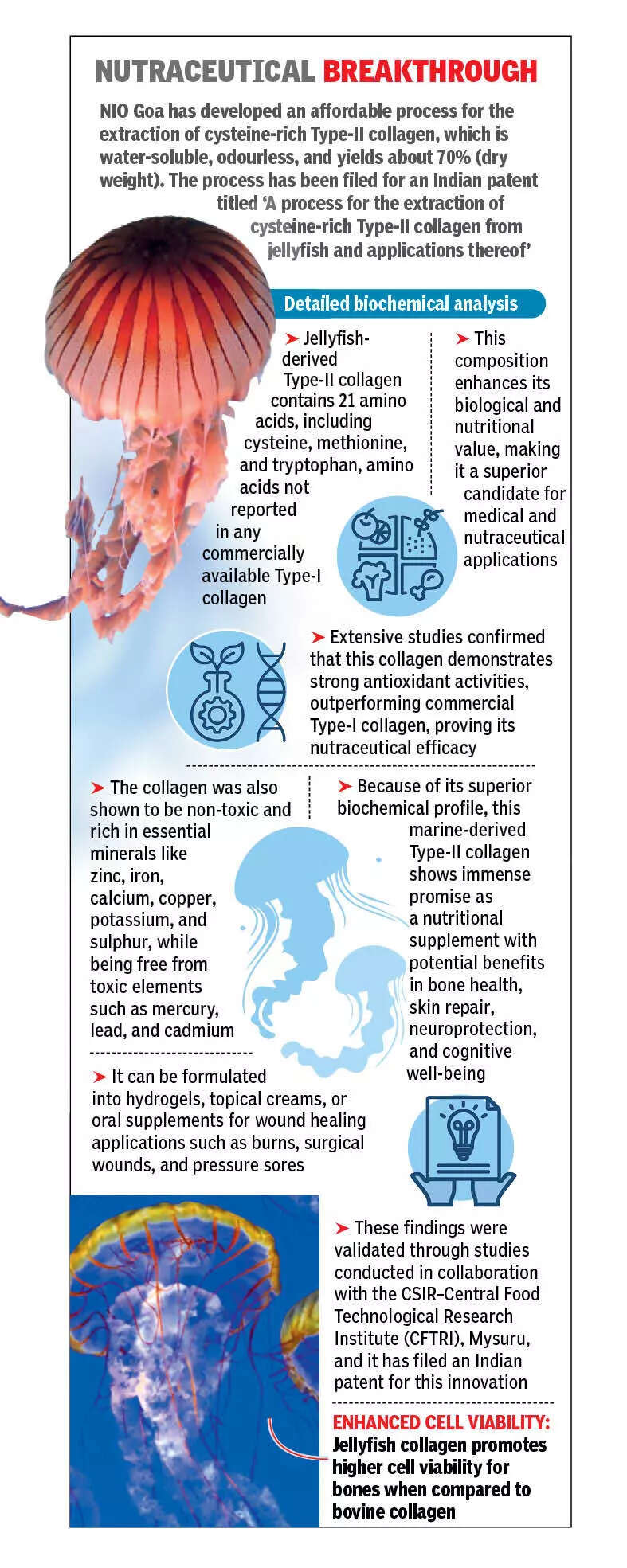ARTICLE AD BOX

Each year, particularly after the monsoon, fishermen across Goa report their nets returning nearly full of jellyfish—an occurrence increasingly linked to climate change and nutrient enrichment in coastal waters.
These jellyfish blooms often spoil fishing hauls, threatening local livelihoods.What was once a menace to Goan fishermen may soon emerge as a game-changer in modern medicine.Scientists at the CSIR–National Institute of Oceanography (CSIR–NIO), Goa, have developed an affordable method to extract Type-II collagen from jellyfish (genus chrysaora) found along the Goan beaches. This breakthrough opens vast possibilities for applicationsin wound healing, bone repair, cosmetic medicine and nutraceutical applications.The research, led by senior principal scientist Supriya Tilvi, with her student Saira James, at the Marine Biomolecules and Biomaterials Laboratory, CSIR-NIO, aims to transform a common marine nuisance jellyfish found along the beaches of Caranzalem and Bambolim into a high-value biomedical resource.“This waste can truly be converted into wealth,” says Tilvi. “Jellyfish collagen possesses properties that can revolutionize wound care and regenerative medicine.”
Type-II collagen speeds up wound healing and helps with bone health, especially among senior citizens.Up until now, India has been largely dependent on China for its collagen requirements in the skincare and pharmaceutical industry.The scientists have also discovered that jellyfish collagen shows comparable or superior compatibility with human cells compared to bovine and porcine collagen. As a result, it effectively supports the adhesion and growth of various human cell types.“Importantly, this marine collagen is free from religious and cultural restrictions, offering a sustainable and inclusive alternative to conventional animal-derived collagens,” she added.The collagen extracted from jellyfish is therefore considered a safe and ethical alternative for individuals with religious or dietary restrictions against consuming products derived from cattle or pigs.Beyond healthcare, jellyfish-derived collagen shows significant promise in cosmetic and nutraceutical industries.“It can be beneficial to the beauty industry. Since it promotes skin regeneration without scarring, it can be used in cosmetic surgery and advanced skincare formulations,” said James.“Moreover, as a marine invertebrate, it carries no risk of transmitting zoonotic diseases or other viral vectors,” she told TOI.Director of CSIR-NIO, professor Sunil Kumar Singh, expressed optimism about this discovery that demonstrates how marine research can provide sustainable solutions to human health while supporting coastal communities. “It is a step toward a cleaner ocean and a healthier world. With jellyfish now appearing in abundance along both India’s East and West coasts, this breakthrough may not only provide new biomedical materials but also create economic opportunities for local fishermen, transforming an environmental challenge into an ocean of possibilities,” he said.The CSIR-NIO received a patent for the development of the method of extraction of the collagen, which was received in Nov 2024.


 2 days ago
3
2 days ago
3








 English (US) ·
English (US) ·